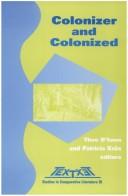| Listing 1 - 5 of 5 |
Sort by
|
Dissertation
Abstract | Keywords | Export | Availability | Bookmark
 Loading...
Loading...Choose an application
- Reference Manager
- EndNote
- RefWorks (Direct export to RefWorks)
Dissertation
Abstract | Keywords | Export | Availability | Bookmark
 Loading...
Loading...Choose an application
- Reference Manager
- EndNote
- RefWorks (Direct export to RefWorks)
Dissertation
Year: 2001 Publisher: Leiden : s.n.,
Abstract | Keywords | Export | Availability | Bookmark
 Loading...
Loading...Choose an application
- Reference Manager
- EndNote
- RefWorks (Direct export to RefWorks)
Book

ISBN: 2367814082 2842697677 Year: 2021 Publisher: Montpellier : Presses universitaires de la Méditerranée,
Abstract | Keywords | Export | Availability | Bookmark
 Loading...
Loading...Choose an application
- Reference Manager
- EndNote
- RefWorks (Direct export to RefWorks)
‘Transport’ is a delightfully open word; adding an ‘s’ to the original makes it even more interesting. The participants in the Conference which was organized on this topic by the Cerpac, early November 2005 at the Université Paul-Valéry, Montpellier (France), explored several facets of the word. They started with ‘Means of transport’, in Australia, New Zealand and South Africa. They then moved to ‘Forced transport’, which dealt with West African slaves, Tasmanian Aborigines, Indo-Caribbean women and Japanese-Canadians. ‘Travel’ offered some gentler kind of transport, from India to South Carolina and the Tongan Islands. And the very same word offered a way of ‘Crossing Borders’ with the symbolism in Salman Rushdie’s or V.S. Naipaul’s novels, or the transfer of mentalities in the 18th century. All in all, we covered a lot of ground from beginning to end. And now, readers, just allow yourselves to be. . . transported. « Transport » est un mot d’une richesse et d’une ouverture étonnantes; ajouter un « s » à l’original le rend encore plus intéressant. Début novembre 2005, un colloque a été organisé par le Cerpac sur le sujet à l’université Paul-Valéry, Montpellier (France), et ses participants explorèrent plusieurs facettes du mot. Ils débutèrent par « Moyens de transport », en Australie, en Nouvelle-Zélande et en Afrique du Sud ; puis ils passèrent à « Transport forcé », où il fut question des esclaves d’Afrique de l’Ouest, des Aborigènes de Tasmanie, des femmes caribéennes d’origine indienne, et des Canadiens-Japonais. « Voyage » permit de se transporter de façon plus douce, de l’Inde à la Caroline du Sud et aux îles Tonga. Et le même mot offrit l’occasion de « Traverser les frontières », qu’il s’agisse du symbolisme dans les romans de Salman Rushdie ou ceux de V.S. Naipaul, ou du transfert des mentalités au XVIIIe siècle. Au total, depuis le début jusqu’à la fin, un grand espace d’étude fut parcouru. Il ne reste plus maintenant au lecteur qu’à se laisser...…
Political Science Public Admin. & Development --- esclavage --- commonwealth --- transports --- Empire Britannique --- slavery --- Commonwealth --- British Empire


ISBN: 904200410X 9789042004108 9789004488861 9004488863 Year: 2000 Publisher: Amsterdam : Rodopi,
Abstract | Keywords | Export | Availability | Bookmark
 Loading...
Loading...Choose an application
- Reference Manager
- EndNote
- RefWorks (Direct export to RefWorks)
Over the last two decades, the experiences of colonization and decolonization, once safely relegated to the margins of what occupied students of history and literature, have shifted into the latter's center of attention, in the West as elsewhere. This attention does not restrict itself to the historical dimension of colonization and decolonization, but also focuses upon their impact upon the present, for both colonizers and colonized. The nearly fifty essays here gathered examine how literature, now and in the past, keeps and has kept alive the experiences - both individual and collective - of colonization and decolonization. The contributors to this volume hail from the four corners of the earth, East and West, North and South. The authors discussed range from international luminaries past and present such as Aphra Behn, Racine, Blaise Cendrars, Salman Rushdie, Graham Greene, Derek Walcott, Guimarães Rosa, J.M. Coetzee, André Brink, and Assia Djebar, to less known but certainly not lesser authors like Gioconda Belli, René Depestre, Amadou Koné, Elisa Chimenti, Sapho, Arthur Nortje, Es'kia Mphahlele, Mark Behr, Viktor Paskov, Evelyn Wilwert, and Leïla Houari. Issues addressed include the role of travel writing in forging images of foreign lands for domestic consumption, the reception and translation of Western classics in the East, the impact of contemporary Chinese cinema upon both native and Western audiences, and the use of Western generic novel conventions in modern Egyptian literature... Back cover.
| Listing 1 - 5 of 5 |
Sort by
|

 Search
Search Feedback
Feedback About UniCat
About UniCat  Help
Help News
News